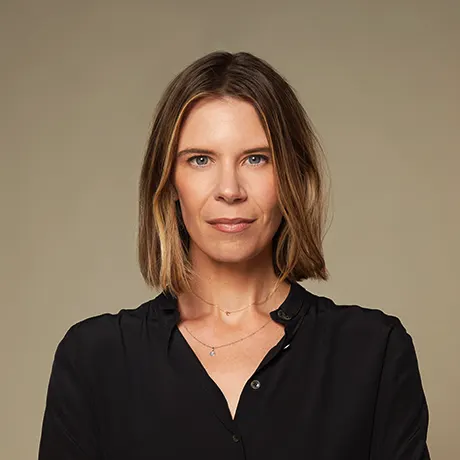Stay in the know
All our latest podcasts delivered right to your inbox.
Eric Tivers had always struggled with reading. Then someone told Eric her own story about how ADHD made it hard for her to read. Then it clicked with Eric that he could have ADHD, too.
Before his “aha” moment, Eric had trouble studying and keeping his GPA up in college. He’d been evaluated as a child, and he’d had an IEP in school. But they hadn’t picked up on his ADHD. Reading his old report cards now, it’s obvious to Eric that he was struggling with ADHD all along.
Eric, a licensed clinical social worker, is the founder and CEO of the ADHD reWired network. Getting diagnosed with and understanding ADHD has been pivotal in his self-awareness journey. On his show and in all his work, he’s candid about his struggles. “When we can get vulnerable … that’s where real growth happens.”
This isn’t the first time host Laura Key and Eric have chatted. Laura was recently on an episode of Eric’s podcast, ADHD reWired.
Related resources
Episode transcript
Eric: I had a dinner date with a friend, and she was sharing with me that she was recently diagnosed with ADHD. And she was describing her sort of experience of having ADHD, particularly around difficulties she had with reading. All the light bulbs were going off. And it was someone describing an internal experience that I thought only I had. I went for an evaluation. I got that diagnosis. I was prescribed a stimulant medication. And it was the very first time in my life that I read a chapter of a book. And I knew what I had read. And it was after that moment that I knew that I actually really could be successful.
Laura: From the Understood Podcast Network, this is "ADHD Aha!," a podcast where people share the moment when it finally clicked that they or someone they know has ADHD. My name is Laura Key. I'm the editorial director here at Understood. And as someone who's had my own ADHD "aha" moment, I'll be your host.
I'm here today with Eric Tivers. Eric is a licensed clinical social worker, and he's also the founder and CEO of "ADHD reWired." Thanks so much for being here today, Eric. It was such a pleasure to be on your podcast, and I'm thrilled to have you here on "ADHD Aha!"
Eric: Thanks so much.
Laura: I usually like to get started, Eric, by asking people right off the bat when you were officially diagnosed with ADHD. And what was happening at that time in your life?
Eric: Yeah, so I was officially diagnosed at the very start of my sophomore year of college, so I was 19. And what was happening in my life then was my freshman year of undergrad, first semester I got a 2.2 GPA and had — I was at risk of losing a bunch of grant and scholarship money. And so I decided it would probably be wise to open up more books than beers for the second semester. So I did that and was rewarded with a 1.8 GPA.
Laura: How did that happen? How did it go down? Was it that when you were getting the 2.2, you were winging it and kind of leaning into your ADHD workarounds and that was working? And then when you were trying hard, it was so hard to focus that it actually was more hurtful than helpful?
Eric: I think so. And, you know, I'm sure that my sleep was awful, and my self-care wasn't great. And, yeah, I really — I didn't know how to study. My approach was just work as hard as possible for as many hours as possible, and that was frustrating. I even remember taking a study skills class and just being really frustrated by like, I'm putting in all this effort and I'm not getting the results. And I really was like working hard. I just didn't really have the skills, and I wasn't sure why I was doing so poorly.
So my parents were threatening to pull me out of school if I didn't get it up that second semester. And obviously, I went the wrong way. And that summer I had a dinner date with this girl. I actually don't even remember who she was. And I wish I could so I can actually thank her, because it was because of her that I ended up getting diagnosed. 'Cause she was sharing with me that she had gotten diagnosed. And it was when she was describing the difficulties she used to have with reading where I was like, oh my God, that's exactly what I experience.
And it was that experience of reading something and within, you know, probably the first paragraph, something that I read that triggered a thought. And so now I'm thinking about the other thing while I'm continuing to read, not realizing I'm not processing a single word that I'm actually reading. So I would get to the end of a chapter and be like, I read what I was supposed to read. I have no idea what I just read though. So I was able to convince my parents for one more shot at school.
That first week back, I made an appointment at the University Health Center with a psychiatrist, and he did an evaluation. And I think one of his first questions to me was, wait, so you were not identified as having ADHD? And to that I said, "Well, I did have an IEP, but it was not for ADHD." So I got my diagnosis early on in my sophomore year of college and I was prescribed a stimulant medication. First semester I got a 3.75. I had never gotten grades like that ever. And I remember it was my first time taking ADHD meds — it's one of the sort of life-changing moments where — I remember I was sitting in, I got this really awful squeaky leather, fake leather chair from Goodwill for about $2. And I was sitting in this chair reading this book, and for the very first time in my life, I could say I've read this chapter of a book, and I actually knew what I had just read.
And I've told the story probably hundreds of times, and I still get kind of choked up telling it because it was — to me, I look at life as there is before that moment and then there is after that moment.
Laura: That is so powerful. I have a million questions following that, but I just want to take a moment and bask in the power of that moment and the power of feeling like yourself.
Eric: Yeah. You know, it's one of these things where it's like you don't notice. It's almost like our messes. We don't notice how much it's bothering us until it's cleaned up. And then we're like, oh, this feels nice. I didn't realize that my brain was sort of so busy and foggy sort of at the same time that that moment of when those meds first kicked in and I started reading, that was like the only thing I was thinking about. It was this weird sensation. And I had like, wait, is this how neurotypical brains kind of operate? Because I always sort of knew that I, you know, I was smart, but like my grades never really showed it because I had what they call the "FAFA syndrome." I would get an F and I would work really hard, pull it up to, you know, an A. So my grades like FAAFA, you know, so it's like it was feast or famine, right?
Laura: I've never heard that before, FAFA. I like that.
Eric: It's not mine — I don't remember where I heard it from, but yeah. So it was almost like that moment in the opening credits of "The Simpsons" when the clouds clear. Kind of like what that moment was like.
Laura: Yeah, that's perfect. I'm really glad — and we need to, if anyone listening may know who Eric was out to dinner with, if we could send some flowers to her.
Eric: Seriously? I think it was like maybe first episode of my podcast that I shared the story and basically said, like, if you happen to be listening to this or you know who this person is, please reach out to me because I want to buy you dinner.
Laura: You've mentioned reading struggles. I know you had an IEP growing up. That's — for folks who don't know, that's an Individualized Education Program, which lays out the supports and services that kids need to have equal access in school. What did your IEP say? Like you weren't diagnosed with ADHD, but they must have seen something.
Eric: I think it was, if I recall, the nonspecific learning disability. I think there was a math learning disability in there. But, you know, I go back through, you know, dig up my old school records and it's, you know, it's kind of a classic story. It's all right there in all the teacher's comments, like, there was enough to diagnose me in every report card I ever got. Right? It was like "disorganized." "Doesn't apply himself." Like "is capable of doing so much more." "Is bright, but is not showing what he knows." "Doesn't use his time well." So it was — sorry. I totally forgot the question.
Laura: We're going to leave that in. You already answered it. You did it. I was asking about what was in the IEP. I asked because there's so much comorbidity, co-occurrence between learning disabilities and ADHD and in particular something you mentioned — struggling with reading comprehension. It could come from either of those, right? Like you're too distracted and you keep, you know, losing the thread.
Eric: And I think that's probably the bigger part of it. There probably is, like, some LD stuff, especially with, like, writing. Like, I always had a hard time of, like, retelling, like, and synthesizing a story. Or like when I used to read fiction that, like, keeping track of the characters. Like, one of the things I had learned to do was I get, like, sticky notes in the back of my book, and for every character I would like, have a sticky note for that character to add key things to it.
Laura: Did you feel like you had the support that you needed growing up? I'm interested in this because you had the IEP, so obviously you were getting some supports and services. But it wasn't known, at least to you and your teachers, that you had ADHD.
Eric: Yeah, it's a great question. No. I mean, even when you just asked that question, I sort of feel like myself getting the goose bumps. And, you know, it's like, well, I think part of that is because so much of what drives what I do is to help people who have felt misunderstood their whole lives, feel understood and understand themselves. And because, you know, to me, that feeling of not understanding yourself and being misunderstood by others is one of the most painful, lonely feelings that there is. So I don't think that I was understood growing up.
So the supports I had, you know, were the kind of those typical IEP things like extended time. I had a resource room that I went to once a day that just kind of helped with getting myself organized. But, you know, like homework was always a battle. And my diagnosis up until that point was that I was lazy. Right? I mean, that's — I still remember my mom saying things like, "You'd rather stare at a wall for an hour than just do your homework that would take you 10 minutes." So it's working through and understanding those things. It just made all the difference.
Self-awareness is a huge sort of both core value and I think a personal kind of work value. Partially because when I switched majors my sophomore year from advertising and marketing to social work. And I remember in one of my intro social work courses learning about this concept of a Johari's window, which is it's a self-awareness framework.
So if you imagine a two-by-two grid of four squares and in one box you have your call — your public self or your arena self-worth. There are things about you that you are aware of and other people are aware of. And then you have your private self, the things that you know about yourself but other people don't know about you. And then have your blind spots, which is the thing that other people see but you don't see yourself, which is where a lot of the work in coaching and therapy happens. And then you have that sort of unknown to self or others. And so this is — I learned this concept right around the time I got the ADHD diagnosis. So it was a really like kind of, you know, kind of mind blowing framework. It's like, oh, this is why I struggled so much.
And then learning about self-awareness is also understanding your strengths and how to use them. It's understanding your challenges and how to sort of work around them. And also the importance of self-advocacy. Being successful when you have ADHD absolutely requires fierce self-advocacy skills. After my freshman year of college, I did well in my classes, partially because I think I negotiated just about every assignment I was ever given with my professors to bend it toward something I was a little bit more interested in. Because I had realized if I was interested in the thing, my brain turns on and I could focus. If I didn't understand why I ever wanted to use this and if it didn't seem relevant to me, it was like reading a foreign language.
Laura: Yeah, that makes perfect sense. I mean, kudos to you. I'm curious. I really am interested. What's the name of that quadrant? The two-by-two?
Eric: Johari's window. J-O-H-A-R-I.
Laura: What was something in that quadrant of not having self-awareness of that you learned about yourself?
Eric: Well I mean, just the big one, just having ADHD and kind of understanding what that means. But you know, it's been from 19 to — I'm 41 now. Like I've taken the sort of the idea of breaking through a pain like a window pane. It's this double meaning. Because when we uncover a blind spot, it hurts. It absolutely hurts. It's kind of crushes the ego. It's like, here's this thing, like how other people knew about you, but you didn't see it until now, right? It's the extreme of you've been walking around spinach in your teeth and nobody's told you. And you look in the mirror, you're like, oh, crap.
Laura: Now I'm the one with goose bumps when you talk about that, really.
Eric: And so for me, it was looking at what sort of came out of every time I uncovered a blind spot. And so when I realized while the initial sort of shock of uncovering a blind spot can be painful, the growth and strength that came from that exponentially grew tenfold. So I say I'm always looking for blind spots because the moment we think we have uncovered all of our blind spots is where our ego's setting itself up to get crushed.
We all have blind spots. And there's two ways to uncover our blind spots. One is to seek them out. You know, asking for feedback, being sort of mindful and self-aware. The other, which often doesn't come at in a kind regard, and so when we get all this feedback from people, then it's often more critical. And it could be things like getting fired, losing friends, relationships ending, inadvertently pissing someone off, doing something wrong. It's those sort of negative feedback loops that if you're open to growing, you can be open to it. If you're not, you tend to look at those kind of scenarios and point the finger outwards.
Laura: So I mentioned earlier I was on Eric's show, "ADHD reWired." He interviewed me. It was an amazing experience. We both approach podcasting in slightly different ways, but I think also in ways that suit our ADHD brain. And the way that you host your show, it was — you were so streamlined. We're getting a little bit meta here, but I do like to talk about the process of it all and how it suits your ADHD brain. What do you love about podcasting, and how does it suit your brain?
Eric: I think part of it, it's sort of real-time curiosity unfolding. You know, I get to help people tell their story. And even when I do have clinicians, coaches, or experts on, I'm still interested in their story. Because I want people to be able to hear themselves in other people. Because I know how powerful that really is. You know, most of your listeners, I'm guessing, probably have had that experience of maybe reading their first book on ADHD, and — or listening or watching, maybe like "How to ADHD" on YouTube and just feeling so seen.
And so that feeling of I'm drawing not only my guest into this conversation and really staying curious about their experience, sort of thinking about it through the lens of all of my listeners — to me is something I find really fun. And knowing how much feedback I've gotten from my listening community and just how appreciative they've been of the style that I use, because, you know, it's — I don't try to make it a perfect show. Like, we leave in mistakes. We, you know, we joke about it. We go on tangents. We sometimes come back to them.
It's even in that piece of — I asked the question, the person didn't really respond to the question. Now we're talking about something. Like that also shows ADHD. And so I'm not trying to be super polished, and I don't try to even let people think that I have all my shit together because I don't. One of my other coaches, Kat Hoyer, has a phrase that she uses that I love, and it's "We can be thriving and be a hot mess all at the same time."
Laura: I love that.
Eric: I'm very influenced by Brené Brown's work and vulnerability, and it really is — it's like when we can get vulnerable and be OK with areas that we're struggling with and talk about them and not sort of hide in shame, that's where real growth happens. So when we can just acknowledge it, we can share it with someone else who gets it, who isn't judging you, who can, you know, respond "Me too." That — we can really actually work on the things we're trying to work on.
Laura: Yeah. And not just for the listeners, but for ourselves as the host. I mean, I've never been as open about my ADHD as I am on this show, which is a little bit nerve-racking in some ways.
Eric: Well, I know my first year of podcasting was definitely more nerve-racking than subsequent years. I remember — I think it was the first like month or two I had a listener email me. The first part of the email was, "Thank you so much for putting out what you're doing." The second part was, "It takes a lot of balls to share what you're doing." And then I immediately had like this huge vulnerability hangover. And I was like, "Oh God, what did I share? Is it too much?"
And one of the episodes I talk a lot about on my podcast is episode 47. So I was like, you know, gearing up for launch, my second season of coaching groups. I was starting a lot of these marketing strategies and you know, they work. They're a lot of work, though. And I was looking ahead on my calendar, and I was hired to give a presentation to this parent group in the school district. And I knew like the timing of this wasn't going to be great cause I knew I was going to be in that launch week, but I said yes. And so I'm coming in. I think the presentation was on a Thursday and I had to have my episode to my editor by Friday so they had the time to get it out.
And so I'm driving to this presentation and it's about 45 minutes away. I had no episode in the can, nothing even scheduled. I had been going off only a couple hours of sleep like several nights in a row because I was like in my office until like, you know, 12, 1, 2:00 in the morning creating content. So I just I brought my little personal recorder with me in the car and just kind of went stream of consciousness. And I was very close to not really seeing it because it's like, whoa, if you can have a, an auditory MRI of ADHD, that would be it. Because it was like, I don't think I finish a single thought or sentence the entire time. I mean, it was — I was going to have a hot mess at that point. And I did release it.
And I got so many listeners who emailed me, like really just truly expressing real gratitude for me releasing that. There was one listener that emailed me that brought me to tears. It was — they were starting to wonder if I actually had ADHD because I seemed so together. And that — this is like eight years ago and I'm getting choked out talking about that now. So that really encouraged me to continue doing what I do. I know I wouldn't have been doing this for, you know, eight years now if I didn't love what I was doing.
Laura: Tell me a little bit about your coaching groups.
Eric: So right now we're in registration for our 30th season of coaching groups. I launched these coaching groups. Literally, I was an impulsive idea that I had while recording, and then I just left it in the podcast, like "I'm thinking about doing these groups." The origin of that was I was in therapy at the time, and my therapist was giving me homework. And I would go to my therapy appointment about 20 minutes early, so I had time to actually do the homework that I was supposed to be doing all week. And I'm a therapist by training and I'm like, OK, this is ridiculous. Like, I need more short-term check-ins, because a week seem like forever away. Like, what would I want?
And so what has evolved since then is — so this is a online group that meets three times a week on Zoom. Small groups, 12 people in a group. And then in the groups we have four-person accountability teams and they meet twice a week in addition to the three times a week and check in daily a couple of times a day over like a group chat. So it's really intense. And then we have a membership community that supports our members after they finish, because we know one of the guarantees that I'll make to people is, you know, after the 10 weeks of coaching, you will still have ADHD.
It's always sad when someone's really new to ADHD and they maybe had this belief that this is going to be the thing that cures them. Right? And when I say that and you just see like them get so deflated. And I'm like, I know if this is an OK thing, it's like we're going to learn how to actually better live with ADHD.
Laura: I remember going to therapy for the first time, like, "So how long do I need to be in therapy?" And my therapist was like, "Eh, we'll see."
Eric: They never understood the whole, like, traditional therapy/coaching sort of idea of the best thing you can do is get yourself fired by your clients. But when you're dealing with something that's a lifelong disorder, like, I don't think that that makes sense. The reason I only do group and I don't do one-on-one is because I like positive reinforcement. Because you hear other people talking about the things that maybe only you thought. And when we hear other people say sort of negative things about themselves, and we see these people who also seem to have a lot of success going on in their lives but yet they're expressing this feeling like a fraud and feeling like a failure. And then we realize, oh, I'm kind of doing the same thing. It's so powerful to have these sort of 12 mirrors basically looking back at you, but except now, there's no judgment in reflecting back.
Laura: That's beautiful.
Eric: So when we can be in — I guess it's sort of in commune with other people who get it and they're doing the stuff — we're able to sort of see ourselves in others in a way that for a lot of people actually allows them to really start the real deep work of acceptance. So it's really — it's been an incredible sort of life-changing journey for myself and for members of my community.
About a year ago in the middle of COVID, with the need for more sort of co-working, I launched AdultStudyHall.com. It's a virtual co-working community. And so we have a drop-in room that's always open on Zoom. We also have a handful of facilitated sessions to give people a little bit more structure. But it's just basically like, all right, here's what we're going to be doing. What are you going to work on? All right, let's go. And we do it. Like once a month we'll do a pomodoro dance party. Or we do two work cycles that are 50 minutes long. And then after each 50-minute work cycle, we'll do a 10-minute dance break. And it's fun. And it's one of those things where it's like, it's so simple and yet so helpful.
Laura: That's what I was just going to say. Such helpful, impactful, but also fun work that you're doing, Eric. And so much of it. I don't know how you are making time for all of this, but I'm very impressed. It's just been such a pleasure to get to speak with you again. I'm so grateful for you coming on my show. Your show is "ADHD reWired." It's great. I recommend folks check it out and all of the other cool stuff that Eric mentioned during this interview.
Eric: Thanks, Laura.
Laura: You've been listening to "ADHD Aha!" from the Understood Podcast Network. If you want to share your own "aha" moment, email us at ADHDaha@understood.org. I'd love to hear from you.
If you want to learn more about the topics we covered today, check out the show notes for this episode. We include more resources as well as links to anything we mentioned in the episode.
Understood is a nonprofit organization dedicated to helping people who learn and think differently discover their potential and thrive. We have no affiliation with pharmaceutical companies. Learn more at Understood.org/mission.
"ADHD Aha!" is produced by Jessamine Molli. Say hi, Jessamine.
Jessamine: Hi, everyone.
Laura: Briana Berry is our production director. Our theme music was written by Justin D. Wright, who also mixes the show. For the Understood Podcast Network, Scott Cocchiere is our creative director, Seth Melnick is our executive producer, and I'm your host, Laura Key. Thanks so much for listening.
Host
Latest episodes
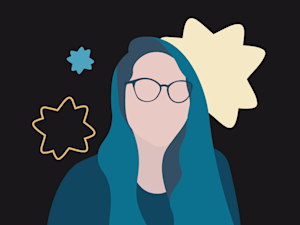
April 16, 2024
ADHD coach Jaye Lin was a gifted kid with undiagnosed ADHD. Now, she’s building communities and helping others cope with ADHD burnout.
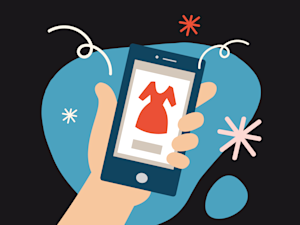
April 2, 2024
Writer Paulette Perhach had money coming in but struggled to keep it in her bank account. An ADHD diagnosis brought her struggles into perspective.
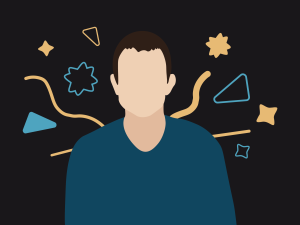
March 19, 2024
Eye to Eye founder David Flink is fighting the “just try harder” myth surrounding ADHD, dyslexia, and other learning and thinking differences.
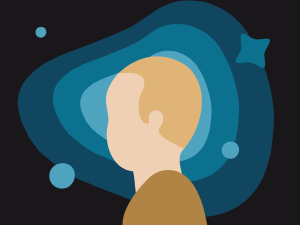
March 5, 2024
Peter Jones used to feel better saying he had a hearing problem rather than considering ADHD. Now, he knows he has ADHD and isn't afraid to say it.
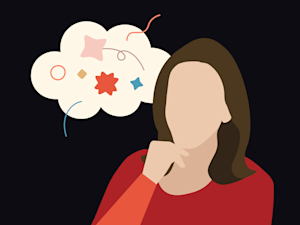
February 20, 2024
Before her ADHD diagnosis, ADHD coach Emily Weinberg thought she was just lazy. But in reality she was stuck in “analysis paralysis.”
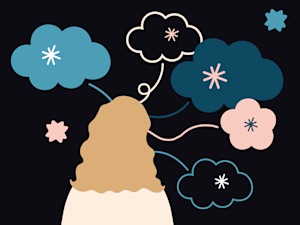
Carol Blumenstein was called an unteachable student. Now, she knows she has ADHD and dyslexia, and supports her five kids who learn differently, too.

January 23, 2024
Executive coach, actor, and former criminal defense attorney Ernest Anemone shares his ADHD story — and why he questions the term “attention deficit.”
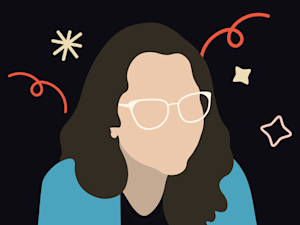
January 9, 2024
ADHD and post-traumatic stress disorder (PTSD) symptoms can look similar. And they can morph into what Hannah calls “a trauma ball of blame.”
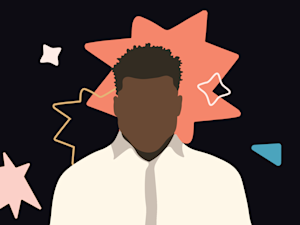
December 26, 2023
Livingston Steele was diagnosed with ADHD about a year into working at Understood.org. His experience and work have given him immense empathy for people with ADHD.
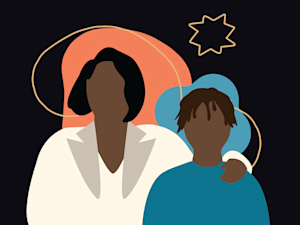
December 12, 2023
Wendy Zanders is a decluttering coach with ADHD. Find out how she got into organizing, and get a few tips for yourself.

